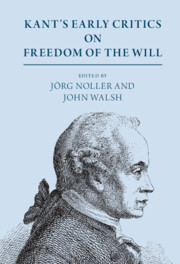Book contents
- Kant’s Early Critics on Freedom of the Will
- Kant’s Early Critics on Freedom of the Will
- Copyright page
- Contents
- Acknowledgements
- Note on the Edition and Translation
- Chronology of the Translated Texts and Kant’s Major Works
- Abbreviations
- Historical and Systematic Introduction
- I Freedom and Determinism
- II Freedom and Imputability
- Carl Christian Erhard Schmid, Lexicon for the Easier Use of the Kantian Writings, 2nd Edition, 1788
- Carl Christian Erhard Schmid, Attempt at a Moral Philosophy, Jena, 1790
- Johann Christoph Schwab, “On the Two Kinds of I, and the Concept of Freedom in Kant’s Ethics,” Philosophisches Archiv 1(1) (1792), 69–80
- Johann Christoph Schwab, “On Intelligible Fatalism in the Critical Philosophy,” Philosophisches Archiv 2(2) (1794), 26–33
- Karl Leonhard Reinhold, Contributions to the Correction of Previous Misunderstandings of Philosophers, Volume ii, Concerning the Foundation of Philosophical Knowledge, Metaphysics, Ethics, Moral Religion, and Doctrine of Taste, Jena, 1794
- III Freedom and Consciousness
- IV Freedom and Skepticism
- V Freedom and Choice
- Appendix: Biographical Sketches
- Glossary
- Notes
- Bibliography
- Index of Persons
- Index of Subjects
Johann Christoph Schwab, “On the Two Kinds of I, and the Concept of Freedom in Kant’s Ethics,” Philosophisches Archiv 1(1) (1792), 69–80
from II - Freedom and Imputability
Published online by Cambridge University Press: 24 March 2022
- Kant’s Early Critics on Freedom of the Will
- Kant’s Early Critics on Freedom of the Will
- Copyright page
- Contents
- Acknowledgements
- Note on the Edition and Translation
- Chronology of the Translated Texts and Kant’s Major Works
- Abbreviations
- Historical and Systematic Introduction
- I Freedom and Determinism
- II Freedom and Imputability
- Carl Christian Erhard Schmid, Lexicon for the Easier Use of the Kantian Writings, 2nd Edition, 1788
- Carl Christian Erhard Schmid, Attempt at a Moral Philosophy, Jena, 1790
- Johann Christoph Schwab, “On the Two Kinds of I, and the Concept of Freedom in Kant’s Ethics,” Philosophisches Archiv 1(1) (1792), 69–80
- Johann Christoph Schwab, “On Intelligible Fatalism in the Critical Philosophy,” Philosophisches Archiv 2(2) (1794), 26–33
- Karl Leonhard Reinhold, Contributions to the Correction of Previous Misunderstandings of Philosophers, Volume ii, Concerning the Foundation of Philosophical Knowledge, Metaphysics, Ethics, Moral Religion, and Doctrine of Taste, Jena, 1794
- III Freedom and Consciousness
- IV Freedom and Skepticism
- V Freedom and Choice
- Appendix: Biographical Sketches
- Glossary
- Notes
- Bibliography
- Index of Persons
- Index of Subjects
Summary
In “On the Two Kinds of I, and the Concept of Freedom in Kant’s Ethics” (1792), Johann Christoph Schwab treats Schmid’s claim that the sensible self is grounded in a supersensible I, which parallels Kant’s distinction between the empirical and intelligible character. Schwab echoes Friedrich Heinrich Jacobi’s charge that such a supersensible posit is guilty of an illicit extension of the categories beyond the sphere of possible experience. Moreover, Schwab maintains, even if this supersensible posit is granted, nothing could be predicated of it and yet Schmid makes several claims about it, e.g. it is the ground of all our actions, it is the ground of space and time, it is unalterable, etc. Schwab concludes the essay by taking issue with Schmid’s claim that on the Leibnizian-Wolffian view, the determining grounds of action are entirely beyond the agent’s control. In response to this charge, Schwab appeals to the Leibnizian-Wolffian conception of spontaneity and claims that the determining grounds of free action are contained within the agent itself.
- Type
- Chapter
- Information
- Kant's Early Critics on Freedom of the Will , pp. 83 - 88Publisher: Cambridge University PressPrint publication year: 2022



